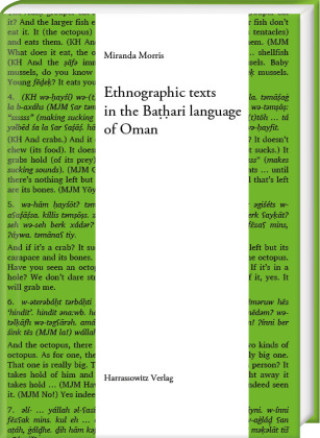
Kód: 45246445
Ethnographic texts in the Ba hari language of Oman
Autor Miranda Morris
Ba hari, called B ahr t by its speakers, is one of the six unwritten Semitic languages of southern Arabia. It is no longer a living language, and today only a handful of older people still speak it. The B ahira were the indigeno ... celý popis
- Jazyk:
 Angličtina
Angličtina - Vazba: Pevná
- Počet stran: 792
Nakladatelství: Harrassowitz, 2024
- Více informací o knize

4144 Kč
Dostupnost:
50 % šance Máme informaci, že by titul mohl být dostupný. Na základě vaší objednávky se ho pokusíme do 6 týdnů zajistit.
Máme informaci, že by titul mohl být dostupný. Na základě vaší objednávky se ho pokusíme do 6 týdnů zajistit.Prohledáme celý svět
Mohlo by se vám také líbit
-

Dune
216 Kč -

Haunting Adeline
621 Kč -

Berserk Deluxe Volume 2
1092 Kč -

White Nights
89 Kč -

Powerless
268 Kč -

Atomic Habits
330 Kč -

Dune Messiah
228 Kč -

Berserk Deluxe Volume 3
1142 Kč -

One Day
221 Kč -

Berserk Deluxe Volume 1
1115 Kč -

Iron Flame
368 Kč -

Surrounded by Idiots
213 Kč -

Harry Potter and the Prisoner of Azkaban (Minalima Edition)
993 Kč -

Gravity Falls Journal 3
443 Kč -

Heaven Official's Blessing: Tian Guan Ci Fu (Novel) Vol. 1
440 Kč -

The Creative Act
568 Kč -

Dune
276 Kč -

Hunting Adeline
624 Kč -

A Little Life
290 Kč -

Children of Dune
230 Kč -

Heaven Official's Blessing: Tian Guan Ci Fu (Novel) Vol. 2
427 Kč
Dárkový poukaz: Radost zaručena
- Darujte poukaz v libovolné hodnotě a my se postaráme o zbytek.
- Poukaz se vztahuje na celou naši nabídku.
- Elektronický poukaz vytisknete z e-mailu a můžete ihned darovat.
- Platnost poukazu je 12 měsíců od data vystavení.
Informovat o naskladnění knihy
Zadejte do formuláře e-mailovou adresu a jakmile knihu naskladníme, zašleme vám o tom zprávu. Pohlídáme vše za vás.
Více informací o knize Ethnographic texts in the Ba hari language of Oman
Nákupem získáte 414 bodů
 Anotace knihy
Anotace knihy
Ba hari, called B ahr t by its speakers, is one of the six unwritten Semitic languages of southern Arabia. It is no longer a living language, and today only a handful of older people still speak it. The B ahira were the indigenous inhabitants of the drier areas of Dhofar. Displaced by more powerful incomers, they ended up in this infertile strip of shoreline. Their own migration history recalls a time when their number was greater, but today they are a small tribe, settled in the new towns of Sharbithat and Ashwaymiyah on the coast, or in Zakhr in the desert plateau above. In this book some 400 texts from this remote and marginalised community are presented in B ahr t transcription and English translation, documented through field recordings or by oral transmission directly to the author. The purpose of the recordings, spanning the period from 1976 to 2016, was to study their way of life prior to 1970 and the accession of Sultan Qaboos, when so much changed. The author asked about specific skills, encouraged speakers to reminisce about their past and to recall stories they used to tell. Those who generously shared their memories were all elderly, the product of an earlier oral culture. Formerly, their survival depended on harvesting the sea. Before the dugout canoe, they fished by swimming out to sea on inflated goatskins. The small numbers of goats they raised were therefore as important for their skins as for their meat and milk. The community was largely self-sufficient; they had a wealth of specialist knowledge about the sea and the fauna and flora of their area. It was this expertise that enabled them to extract sustenance from such a harsh and unforgiving environment.
 Parametry knihy
Parametry knihy
Zařazení knihy Knihy v angličtině Language
4144 Kč
- Plný název: Ethnographic texts in the Ba hari language of Oman
- Autor: Miranda Morris
- Jazyk:
 Angličtina
Angličtina - Vazba: Pevná
- Počet stran: 792
- EAN: 9783447120845
- ID: 45246445
- Nakladatelství: Harrassowitz
- Rozměry: 240 × 170 mm
- Datum vydání: 13. March 2024
Osobní odběr Praha, Brno a 12903 dalších
Copyright ©2008-24 nejlevnejsi-knihy.cz Všechna práva vyhrazenaSoukromíCookies


 Vrácení do měsíce
Vrácení do měsíce 571 999 099 (8-15.30h)
571 999 099 (8-15.30h)